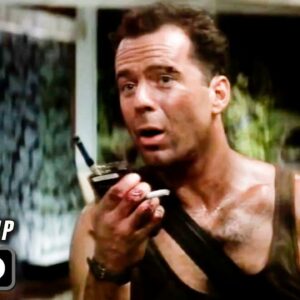In the world of entertainment, few actors have carved out a career as iconic and enduring as Bruce Willis. With his rugged good looks, effortless charisma, and everyman charm, Willis has transcended his initial start as a television actor to become one of Hollywood’s most recognized and respected action stars. But what makes his journey to stardom so compelling is not just his meteoric rise through the ranks of show business but the relatable, often humble experiences that shaped him along the way.
Early Life and Humble Beginnings
Walter Bruce Willis was born on March 19, 1955, in Idar-Oberstein, West Germany. The son of a U.S. soldier stationed overseas and a German mother, Willis spent the first two years of his life on a military base before his family relocated to the United States, settling in New Jersey. It was here, in the blue-collar towns of Penns Grove, that young Bruce began to form the tough, grounded persona that would later define his career.
Raised in a working-class family, Willis was no stranger to the grit and grind of daily life. His father worked as a welder and mechanic, and his mother was a bank teller, instilling in Willis a strong work ethic and a respect for the hands-on trades that kept America moving. These formative years, living in the shadow of industrial New Jersey, played a pivotal role in shaping his worldview. It gave him a deep understanding of blue-collar struggles, a perspective that he would later bring to many of his on-screen characters, particularly those tough, resilient men who refused to back down in the face of adversity.
Childhood Stutter and Overcoming It
As with many future stars, Willis’s early life wasn’t without its challenges. He struggled with a debilitating stutter as a child, a condition that made him shy and self-conscious. In interviews, Willis has candidly shared how difficult it was for him to express himself, often resorting to silence in social situations to avoid embarrassment. This stutter could have been a roadblock, limiting his potential to communicate effectively or, more tragically, to dream of a career in the limelight.
But fate, as it often does, had other plans for young Bruce. It was during his high school years that he discovered the transformative power of acting. Performing in front of an audience seemed to alleviate his speech issues, as if slipping into the skin of another character allowed him to sidestep his own insecurities. He began acting in school plays, and with each performance, his confidence grew. The stage became a sanctuary, a place where he could communicate freely and without the fears that once held him back. Acting, in a sense, became his therapy, and by overcoming his speech impediment, Willis unearthed a passion for performance that would define the rest of his life.
Diverse Job Experience Before Acting
Willis’s early life was filled with a variety of odd jobs that, while not glamorous, provided him with a breadth of experiences that would later inform his acting. Before he made a name for himself in Hollywood, he worked as a security guard, a private investigator, and a bartender, among other jobs. Each of these roles gave him a unique perspective on life and a real-world grounding that many actors who come from more privileged backgrounds may never fully understand.
Working as a private investigator, for example, offered Willis insights into human behavior, deception, and the art of observation—skills that would prove invaluable when crafting complex, layered characters. His time as a bartender, on the other hand, taught him how to interact with a wide range of people, from drunks to daydreamers, hustlers to hopeless romantics. These interactions shaped his ability to connect with others, both on and off-screen. He honed his charisma, learned to think on his feet, and developed a certain streetwise charm that would later become one of his trademarks.
The Influence of Music and Stage Performance
Though acting became his primary focus, Willis’s early love of music never waned. Before he was known as an actor, he was a harmonica player in a blues band. Music, like acting, gave him a way to express himself and to connect with an audience. There’s a certain honesty to playing the blues, an unpretentious, raw emotion that resonates deeply with those who hear it. This connection between musician and audience, this shared understanding of struggle and perseverance, is something Willis would carry with him when he transitioned to acting.
Performing on stage, whether with a harmonica or a script in hand, gave Willis a confidence that many actors spend years cultivating. The immediacy of live performance, the necessity of staying present in the moment, helped him develop a natural ease in front of the camera. His time as a musician also contributed to his unique rhythm as an actor—there’s a musicality to his performances, an understanding of timing and pacing that sets him apart from many of his peers.
Transition to Acting
While many remember Willis as the wise-cracking, tough-as-nails action hero, his early career was defined by comedic roles. His big break came when he was cast opposite Cybill Shepherd in the hit television series Moonlighting. The show, a quirky mix of comedy and drama, allowed Willis to showcase his charm, wit, and impeccable comedic timing. As the fast-talking, sarcastic private investigator David Addison, Willis quickly became a household name, charming audiences with his everyman appeal.
Moonlighting was a perfect fit for Willis at the time, as it allowed him to draw on his working-class roots and his real-life experience as a private investigator. Audiences connected with his character because, unlike many Hollywood stars, Willis felt relatable. He wasn’t a polished, perfect leading man; he was scruffy, rough around the edges, and unafraid to show his vulnerabilities. This authenticity made him a star, and it wasn’t long before Hollywood came calling with bigger and better roles.
Breakthrough with Die Hard
In 1988, Willis took on the role that would forever define his career: John McClane in Die Hard. The film, which has since become a staple of the action genre, was a revelation. Unlike the muscle-bound action heroes of the time—think Schwarzenegger and Stallone—Willis’s McClane was an everyman. He wasn’t a superhero; he was a regular guy, thrust into an extraordinary situation and forced to rely on his wits and his will to survive.
What made Willis’s portrayal of McClane so compelling was the vulnerability he brought to the character. He wasn’t invincible. He got hurt, he bled, he made mistakes. But he kept going, fueled by a determination that resonated with audiences around the world. McClane was a man who could take a punch and keep fighting, a reflection of the working-class ethos that Willis had grown up with.
Die Hard catapulted Willis to international stardom, solidifying him as one of Hollywood’s top action stars. But more than that, it allowed him to showcase the full range of his talents. His McClane was funny, resourceful, and tough, but he was also human. Willis’s ability to blend humor with action, to make audiences laugh one minute and gasp the next, set him apart from the pack and made Die Hard an instant classic.
Legacy and Continuing Impact
As Willis’s career progressed, he continued to play characters that reflected his grounded, blue-collar beginnings. Whether portraying a boxer in Pulp Fiction, a world-weary hitman in The Fifth Element, or an aging police officer in Sin City, Willis has always gravitated toward roles that speak to the resilience of the human spirit. He excels at playing flawed heroes—men who aren’t perfect, but who always rise to the occasion when the chips are down.
Throughout his career, Willis has maintained a connection to his roots. In interviews, he often speaks fondly of his early years in New Jersey, of the lessons he learned working odd jobs and overcoming his stutter. This sense of authenticity has endeared him to fans around the world, who see in him a reflection of their own struggles and triumphs.
In many ways, Willis is the quintessential American actor. He’s tough, resilient, and unpretentious, a man who has built his career on hard work, perseverance, and a deep understanding of the characters he portrays. From his humble beginnings to his status as a global icon, Bruce Willis’s journey is a testament to the power of grit and determination. And as he continues to take on new roles and challenge himself as an actor, there’s no doubt that his legacy will endure for years to come.





